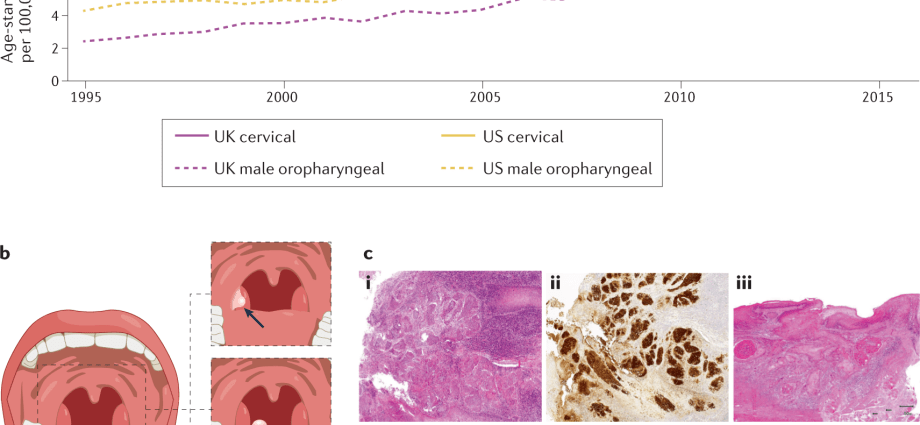One-third of patients diagnosed with throat cancer are infected with human papillomavirus (HPV), mostly associated with cervical cancer, reports the Journal of Clinical Oncology
Infections with the human papillomavirus (HPV) are among the most common in the world. The virus is transmitted mainly sexually through direct contact of the mucous membranes of the genitals, but also the skin around them. The World Health Organization (WHO) estimates that up to 80 percent. Sexually active people develop HPV infection at some point in their lives. For most of them, it is temporary. However, in a certain percentage it becomes chronic, which increases the risk of developing various types of cancer.
Of the more than 100 known subtypes (so-called serotypes) of the human papillomavirus (HPV), several are carcinogenic. There are especially two subtypes – HPV16 and HPV18, which are responsible for almost 70 percent. cases of cervical cancer.
WHO experts estimate that HPV infections are responsible for almost 100 percent. cases of cervical cancer, and in addition for 90 percent. rectal cancer cases, 40 percent cases of cancer of the external genital organs – i.e. vulva, vagina and penis, but also for a certain percentage of head and neck cancers, including 12% cases of cancer of the larynx and pharynx and approx. 3 percent. oral cancers. There are also studies suggesting the involvement of the virus in the development of breast, lung and prostate cancer.
Recent studies indicate an increase in the incidence of throat and laryngeal cancer in connection with HPV infection. Until now, alcohol abuse and smoking have been considered the most important risk factors for these cancers. Scientists suspect that the increase in HPV involvement in the development of these cancers is related to greater sexual freedom and the popularity of oral sex.
To test the relationship between HPV and cancer of some head and neck cancers, scientists from an international team conducted a study of 638 patients suffering from them, including with cancer of the oral cavity (180 patients), cancer of the oropharynx (135 patients), cancer of the lower pharynx / larynx (247 patients). They also examined patients with esophageal cancer (300 people). For comparison, 1600 healthy people were tested. They were all participants in a long-term European study on the relationship between lifestyle and cancer risk – European Prospective Investigation Into Cancer and Nutrition.
Blood samples that were all donated at the start of the study while they were healthy were analyzed for antibodies to HPV16 proteins as well as other carcinogenic human papillomavirus subtypes such as HPV18, HPV31, HPV33, HPV45, HPV52, and HPV6 and HPV11 which are the most common cause of benign but troublesome genital warts (so-called genital warts), and can rarely cause vulvar cancer.
The cancer samples were on average six years old, but some were even more than 10 years old before diagnosis.
It turned out that as many as 35 percent. Oropharyngeal cancer patients have been found to have antibodies to an important protein of HPV 16, abbreviated as E6. It turns off the protein responsible for inhibiting the neoplastic process in cells and thus contributes to its development. The presence of antibodies to the E6 protein in the blood usually indicates the development of cancer.
For comparison, in the control group the percentage of people with antibodies in the blood was 0.6%. There was no relationship between their presence and other head and neck tumors included in the study.
The researchers emphasized that the relationship between the presence of these antibodies and oropharyngeal cancer existed even for patients from whom a blood sample was obtained more than 10 years before cancer diagnosis.
Interestingly, among patients with oropharyngeal cancer and the presence of anti-HPV16 antibodies, a lower percentage of deaths due to various causes was found than among patients without antibodies. Five years after the diagnosis, 84 percent were still alive. people from the first group and 58 percent. the other.
These surprising results provide some evidence that HPV16 infection may be a significant cause of oropharyngeal cancer, comments co-author Dr. Ruth Travis of the University of Oxford.
Sara Hiom from the Cancer Research UK foundation said in an interview with the BBC that HPV viruses are very widespread.
Having sex safely may lower the risk of contracting an infection or passing HPV to someone, but condoms will not completely protect you from infection, she noted. It is known that the virus present on the skin in the genital area can also be a source of infection.
Hiom stressed that it is not known whether the vaccines currently used to prevent cervical cancer in teenage girls (one of them is also approved for boys to prevent genital warts and penile cancer) could reduce the risk of oropharyngeal cancer. If the research confirms this, it will turn out that they can be used more widely in the prevention of malignant neoplasms. (PAP)
jjj / agt /










